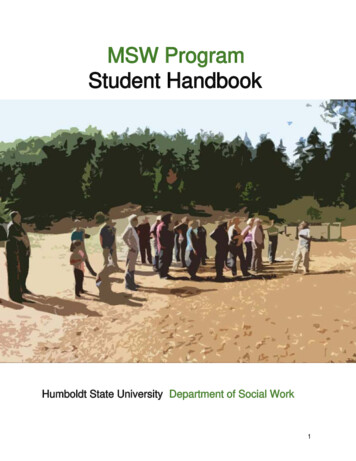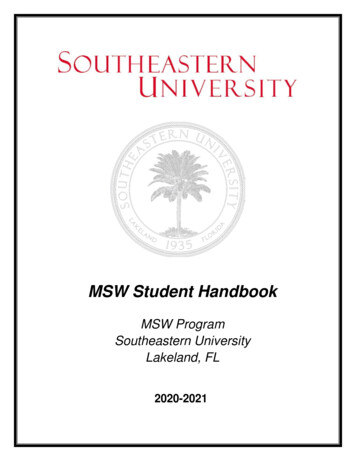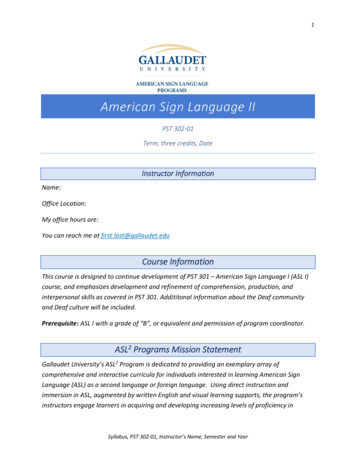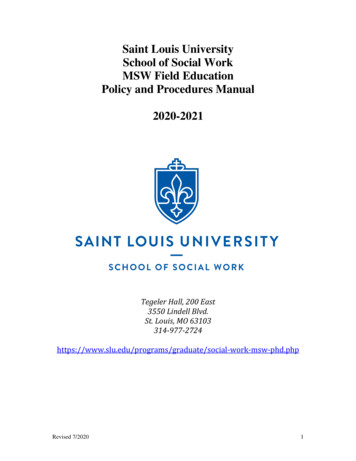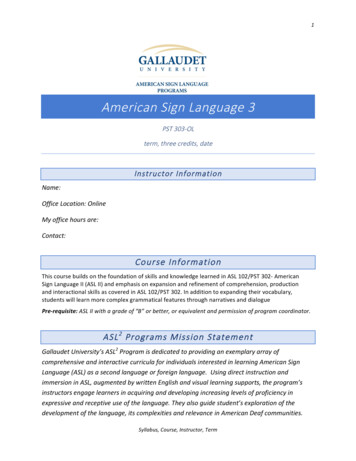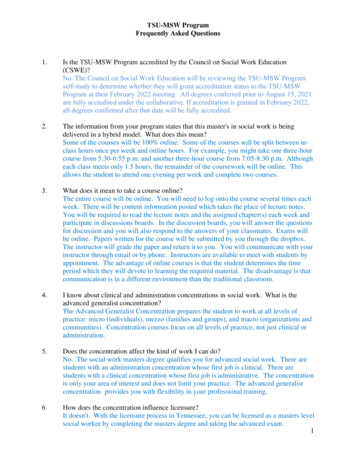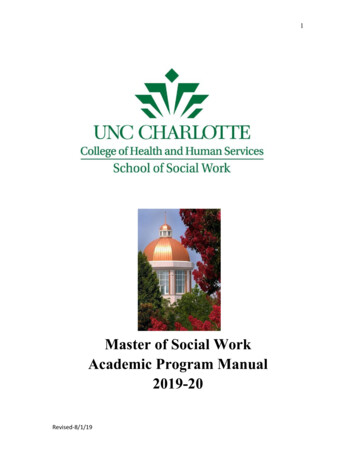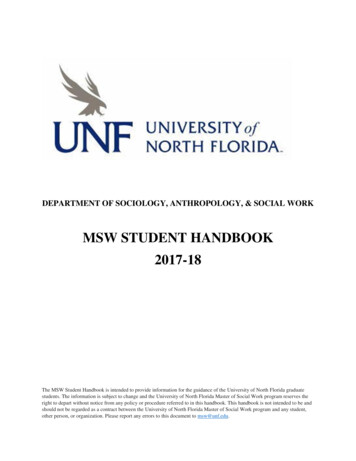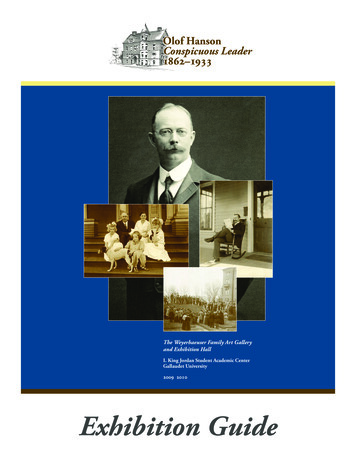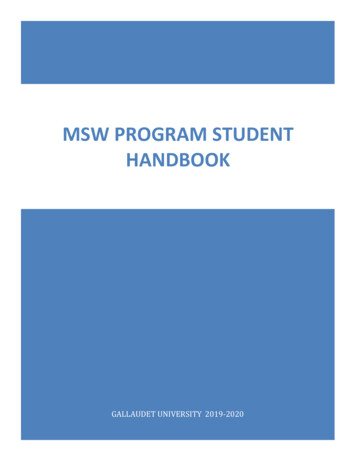
Transcription
MSW PROGRAM STUDENTHANDBOOKGALLAUDET UNIVERSITY 2019-2020
DIRECTORY .4EQUAL OPPORTUNITY POLICIES.5Gallaudet University Statement . 5Department of Social Work Non-discrimination Statement . 5GALLAUDET UNIVERSITY.5History of Gallaudet . 5A Time of Expansion . 5The Gallaudet University Mission Statement . 6The Vision of Gallaudet University . 6The Gallaudet Credo . 7School of Business, Education, and Human Services (SEBHS) and The Graduate School7DEPARTMENT OF SOCIAL WORK HISTORY.8History of Department of Social Work . 8History of The MSW Program . 8Accreditation of the MSW Program . 8The Generalist Practice Model. 9MSW Mission Statement . 9MSW Program Goals: . 9MSW Program Values . 10Foundation Year Competencies: . 10Concentration Year Competencies: . 12The Profession of Social Work . 13Professional Organizations . 14ACADEMIC LIFE . 15Admissions. 15Two-Year Program . 15Three-Year Program . 15International Students . 15Advanced Standing and Course Waivers . 16Transfer Credit . 17Conditional Acceptance . 17Special Student Status . 17Advising . 17American Sign Language Proficiency Interview (ASLPI) Policy . 181
Professional Standards of Behavior . 18Grading Policy . 19Grade Point Average (GPA) . 19Academic Integrity . 22Academic Probation and Dismissal . 22Academic Appeals . 24Grievances. 24Application for Candidacy . 25Graduation Requirements . 25Student Rights and Responsibilities. 26Student Rights . 26Time Limit for Degree Seeking Students . 27Leave of Absence . 27Withdrawal . 28Continuous Enrollment . 28Policy for requesting permission to march at May commencement . 28THE CURRICULUM . 29The Educational Program . 29Recommended Texts:. 30COURSE PLAN . 31Two-Year Course Plan . 31Three-Year Course Plan . 32School Social Work Areas of Focus . 33School Social Work Course Plan . 34Social Work Course Descriptions . 37Course information for International Students . 41FIELD PRACTICUM. 41Overview of the Field Practicum Program . 41Selection of Practicum Sites and Field Instructors . 42RESEARCH REQUIREMENT . 43Institutional Review Board . 43AWARDS . 44G. Arlene Gavin Award . 44Catherine H. Moses Award . 452
Dorothy Polakoff Endowment Scholarship . 46STUDENT ADVISORY COMMITTEE . 46DEPARTMENTAL FINANCIAL ASSISTANCE . 47Graduate Assistantship. 47Tuition Scholarship. . 47Tutoring Assistantship. . 47CONSORTIUM . 48SERVICES AND RESOURCES. 48Technology Help Desk . 48The Library . 49Computers . 49Student Organizations . 49Graduate Social Work Student Organization . 50Part-time Employment . 50Student Health Service . 50Counseling and Psychological Services . 50Career Services . 51Tutorial & Instructional Programs . 51Office of the Ombuds . 51Office of Title IX Coordinator . 52EEO/AFFIRMATIVE ACTION POLICY . 52Scope . 52Policy . 52PROTECTION AGAINST SEXUAL HARASSMENT POLICY . 53APPENDIX A: CSWE Educational Policy and Accreditation StandardsAPPENDIX B: MSW Student code of conductAPPENDIX C: Social Media PolicyAPPENDIX D: MSW Student Authorization to Release InformationAPPENDIX E: MSW Student Concern FormAPPENDIX F: Note Taking Contract FormAPPENDIX G: Application for Admission to Candidacy for the Degree of Master's in SocialWork3
DIRECTORYSOCIAL WORK DEPARTMENT DIRECTORYHall Memorial BuildingPhone (202) 651- 5160FAX (202) 651-5817Department ChairE-MailRoom NumberElizabeth A. Moore, id Barclay, Ph.D., ProfessorDavid.Barclay@gallaudet.eduS337EMiriam Elizabeth Bowman, MSW, esa Crowe Ph.D., ProfessorTeresa.Crowe@gallaudet.eduS337CMargaux Delotte-Bennett, MSW, Lecturer IIMargaux.Delotte-Bennett@gallaudet.eduS334BAudrey Frank, Ph.D., Assistant ProfessorAudrey.Frank@gallaudet.eduS338FElizabeth A. Moore, Ph.D., Associate ProfessorElizabeth.Moore@gallaudet.eduS333CLynda Myers, Ph.D., Assistant ProfessorLynda.Myers@gallaudet.eduS333AConcetta Pucci, Ph.D., Lecturer IIConcetta.Pucci@gallaudet.eduS338CMartha Sheridan, Ph.D., ProfessorMartha.Sheridan@gallaudet.eduS334CKota Takayama, MSW, InstructorKota.Takayama@gallaudet.eduS334ASamuel Weber, Lecturer det.eduS335CDirector, MSW ProgramMartha Sheridan, Ph.D.Director, BA Program in Social WorkKota Takayama, MSWDirector of Field EducationMargaux Delotte-Bennett, MSWFull-Time FacultyProgram Support SpecialistTommy FarrDepartment Conference RoomS335BStudent Mail/Computer LabS3314
EQUAL OPPORTUNITY POLICIESGallaudet University StatementGallaudet University is an equal opportunity employer/educational institution and does not discriminate on the basisof race, color, sex, national origin, religion, age, hearing status, disability, covered veteran status, marital status,personal appearance, sexual orientation, family responsibilities, matriculation, political affiliation, source of income,place of business or residence, pregnancy, childbirth, or any other unlawful basis.Department of Social Work Non-discrimination StatementIn accordance with the Equal Opportunity Policy of Gallaudet University, the Department of Social Work, in all ofits operations and in all of its dealings with faculty, staff, students, field instructors, and field instruction agenciesand programs, is committed to a policy of nondiscrimination. Furthermore, the Department of Social Work placeshigh value on human diversity and endeavors in all of its programs to convey understanding and respect fordiversity. Such diversity includes, but is not limited to, hearing status, race, color, ethnicity, gender, gender identityand gender expression, disability, sexual orientation, age, religion, and national origin.GALLAUDET UNIVERSITYHistory of GallaudetThe First 100 YearsIn 1856, Amos Kendall, a postmaster general during two presidential administrations, donated two acres of his estatein northeast Washington, D.C. to establish a school and housing for 12 deaf and six blind students. The followingyear, Kendall persuaded Congress to incorporate the new school, which was called the Columbia Institution for theInstruction of the Deaf and Dumb and Blind. Edward Miner Gallaudet, the son of Thomas Hopkins Gallaudet,founder of the first school for deaf students in the United States, became the new school's superintendent.Congress authorized the institution to confer college degrees in 1864, and President Abraham Lincoln signed the billinto law. Gallaudet was made president of the institution, including the college, which that year had eight studentsenrolled. He presided over the first commencement in June 1869 when three young men received diplomas. Theirdiplomas were signed by President Ulysses S. Grant, and to this day the diplomas of all Gallaudet graduates aresigned by the presiding U.S. president.In 1894 the name of the college portion of the institution was changed to Gallaudet College in honor of ThomasHopkins Gallaudet and through an act of Congress in 1954, the entire institution became known as GallaudetCollege.A Time of ExpansionIn 1969, President Lyndon Johnson signed an act to create the Model Secondary School for the Deaf (MSSD). Thatsame year, the secretary of the U.S. Department of Health, Education and Welfare and Gallaudet President LeonardElstad signed an agreement authorizing the establishment and operation of MSSD on the Gallaudet campus. A yearlater, President Richard Nixon signed the bill that authorized the establishment of Kendall DemonstrationElementary School. Today, the two schools are part of Gallaudet's Laurent Clerc National Deaf Education Center,which is devoted to the creation and dissemination of educational opportunities for deaf students nationwide.By an act of the U.S. Congress, Gallaudet was granted university status in October 1986. Two years later, in March1988, the Deaf President Now (DPN) movement led to the appointment of the University's first deaf president, Dr. I.King Jordan, '70 and the Board of Trustees' first deaf chair, Philip Bravin, '66. Since then, DPN has becomesynonymous with self-determination and empowerment for deaf and hard of hearing people everywhere.In the 1990s, a generous contribution from the W.K. Kellogg Foundation enabled the University to construct theKellogg Conference Hotel at Gallaudet University, which has become a popular venue for meetings, seminars,receptions, and other events for both on- and off-campus groups.5
The new millennium has brought events such as the Deaf Way II festival that attracted 10,000 deaf, hard of hearing,and hearing people from around the world; the opening of the technology-rich I. King Jordan Student AcademicCenter; and, thanks to the generosity of James Lee Sorenson, chair of Sorenson Development, Inc., the James LeeSorenson Language and Communication Center, a unique facility that provides an inclusive learning environmenttotally compatible with the visu-centric "deaf way of being."The University's undergraduate students can choose from more than 40 majors leading to bachelor of arts orbachelor of science degrees. A small number of hearing undergraduate students-up to five percent of an enteringclass-are also admitted to the University each year. Graduate programs at Gallaudet are open to deaf, hard ofhearing, and hearing students and offer certificates and master of arts, master of science, doctoral, and specialistdegrees in a variety of fields involving professional service to deaf and hard of hearing people.Through the University Career center, students receive internships that provide a wealth of experiential learningopportunities. Recent internships were offered at Merrill Lynch, National Aeronautics and Space Administration,National Institutes of Health, and the World Bank. Students also benefit from an array of services provided by suchcampus units as the Burstein Leadership Institute, Language Planning Institute, Hearing and Speech Center,Cochlear Implant Education Center, and the Center for International Programs and Services.Today, Gallaudet is viewed by deaf and hearing people alike as a primary resource for all things related to deafpeople, including educational and career opportunities; open communication and visual learning; deaf history andculture; American Sign Language; and the impact of technology on the deaf community.GALLAUDET UNIVERSITY MISSION AND GOALSThe Gallaudet University Mission StatementGallaudet University, federally chartered in 1864, is a bilingual, diverse, multicultural institution of higher educationthat ensures the intellectual and professional advancement of deaf and hard of hearing individuals through AmericanSign Language and English. Gallaudet maintains a proud tradition of research and scholarly activity and prepares itsgraduates for career opportunities in a highly competitive, technological, and rapidly changing world.The Vision of Gallaudet UniversityGallaudet University will build upon its rich history as the world's premier higher education institution serving deafand hard of hearing people to become the university of first choice for the most qualified, diverse group of deaf andhard of hearing students in the world, as well as hearing students pursuing careers related to deaf and hard of hearingpeople. Gallaudet will empower its graduates with the knowledge and practical skills vital to achieving personal andprofessional success in the changing local and global communities in which they live and work. Gallaudet will alsostrive to become the leading international resource for research, innovation and outreach related to deaf and hard ofhearing people.Gallaudet will achieve these outcomes through: A bilingual learning environment, featuring American Sign Language and English, that provides fullaccess for all students to learning and communicationA commitment to excellence in learning and student serviceA world-class campus in the nation's capitalCreation of a virtual campus that expands Gallaudet's reach to a broader audience of visual learnersAn environment in which research can grow, develop, and improve the lives and knowledge of all deafand hard of hearing people worldwide6
The Gallaudet CredoGallaudet's Vision Statement expresses what the University aspires to become and achieve as the world's premieracademic institution for deaf and hard of hearing people. Implicit in our vision are core values that serve as guidingprinciples for the way members of the campus community teach, study, work and live. The Gallaudet Credoidentifies and realizes those core values.The Gallaudet University campus community includes students, faculty, teachers and staff, all of whom sharecertain common goals and values that we all believe enrich our academic environment. The community's primarygoal is to prepare students to be informed, literate, productive and responsible citizens. In pursuit of this goal,community members pledge to uphold the following values:We believe that education is a dominant influence on our lives and recognize that learning is a lifelong quest.Therefore we will practice academic and personal integrity and work to create a positive and welcomingenvironment that is open to the free exchange of ideas among members of our community.We believe that every person should be treated with civility and that our community is strengthened by the broaddiversity of its members. Therefore, we will promote and applaud behaviors that support the dignity of individualsand groups and are respectful of others' opinions. We will especially discourage behaviors and attitudes thatdisrespect the diversity of individuals and groups for any reason including religion, race, ethnicity, gender, age,sexual orientation, disability, hearing status, or language and communication preference.We believe that as members of the Gallaudet community we are the recipients of a proud and rich heritage, as wellas contributors to and benefactors of our institution's bright future. Therefore, we will strive to bring credit to ourcommunity and ensure that the institution flourishes and succeeds in its mission.School of Business, Education, and Human Services (SEBHS) and The Graduate SchoolThe Department of Social Work is located within the School of Business, Education, and Human Services (SEBHS)along with seven other academic departments. The MSW Program is one of many graduate programs withinSEBHS. The other graduate programs within SEBHS are located within the Departments of Counseling; Education;Government and Public Affairs; Hearing, Speech and Language Sciences; and Interpretation. The Dean of SEBHSis Dr. Khadijat Rashid, located in Hall Memorial Building, Room S242. There are also graduate programs in ASLand Deaf Studies, History, Linguistics and Psychology Departments, which are located within the College of Artsand Sciences.The MSW Program is also affiliated with the Graduate School, as are all graduate programs. The dean of this unit isDr. Gaurav Mathur; his office is located on the second floor of Fowler Hall. His role is to promote graduateprograms of outstanding quality at Gallaudet and oversee the programs of Continuing Studies. Whenrecommendations for student actions are made (admissions, academic probation, academic dismissal, leave ofabsence, student academic appeals, candidacy, and awarding of the degree) the Department recommendation goesthrough the office of the Dean of SEBHS to the Dean of Graduate School who has the responsibility for admitting,dismissing, and placing students on probation. (For additional information, see the Graduate School )7
DEPARTMENT OF SOCIAL WORK HISTORYHistory of Department of Social WorkThe Department of Social Work offers two programs, an undergraduate social work major, leading to a BA in socialwork, and a master's in social work program. The BA Program prepares students for beginning generalist socialwork practice and the MSW Program prepares students for advanced social work practice with deaf and hard ofhearing populations. The Department faculty and professional staff are actively involved in teaching, scholarlyactivity, and university and community service.The baccalaureate program was initiated in 1970 by Dr. Morris Goldman, professor and chair (now retired) in theDepartment of Sociology. The first director was Mrs. Dorothy Polakoff, who was employed to develop theprogram. Under her guidance, the program was accredited by the Council on Social Work Education for the firsttime in 1976, at which time the department became the Department of Sociology and Social Work. Following Mrs.Polakoff's retirement in 1980, Dr. Janet L. Pray assumed the position of Director of the Program. The jointdepartment continued through 1989, when the establishment of the graduate MSW program necessitated anautonomous department. The Department of Social Work came into being in 1990, with Dr. Pray as chairperson.MSW PROGRAMHistory of The MSW ProgramThe establishment of an MSW program at Gallaudet University had been recommended through the years by manyconcerned with the importance of preparing social workers with knowledge, skills, and values required for workwith Deaf and hard of hearing people. In 1985, the Department received a Presidential Award from Dr. Jerry Lee,then President of Gallaudet University, to conduct a formal needs assessment for an MSW program with this focus.A survey of social service, mental health, and other organizations with services for deaf people indicated thatinadequate numbers of qualified MSW level social workers were available to fill existing and anticipated positions.A survey of MSW programs indicated that content on social work practice with Deaf people was rarely included inthe curriculum, and if it was covered at all, it usually appeared in a course on disability. A survey of alumni showedthere was interest in graduate level social work education at Gallaudet.The findings of the survey provided unequivocal documentation of the need for an MSW Program at Gallaudet, andduring 1986, the social work faculty developed the curriculum for the proposed MSW Program. Dr. I. King Jordan,then Dean of the College of Arts and Sciences, approved released time for the spring of 1987, for Mrs. CatherineMoses, to develop a proposal for the establishment of the MSW Program for submission to the Council on GraduateEducation. She was also awarded a grant from the Administration on Aging, which provided funds to develop aspecial focus on aging and hearing loss, in response to the large numbers of older persons who develop hearing losslater in life.When Dr. Jordan became Gallaudet's first Deaf President in 1988, he stated as one of his goals the preparation ofprofessionals in the field of mental health, including the establishment of an MSW Program. The Graduate Councilapproved the proposal for an MSW Program in December 1988 and with the support of the Universityadministration the proposal went to the Board of Trustees who in turn endorsed the establishment of the Program atits meeting in February 1989. Ms. Catherine Moses was Director of the MSW Program from its beginning in 1989until 1996. In the fall of 1989 the first group of students enrolled in Gallaudet's new MSW Program. The first MSWdegrees were awarded in 1991. In 1999 the Department received a meritorious service award from the MarylandAssociation of the Deaf for contributions made to deaf and hard of hearing people in Maryland and throughout thecountry. The Department is very proud of this recognition of our alumni, students, and faculty.Accreditation of the MSW ProgramThe MSW Program received initial accreditation by the Council on Social Work Education (CSWE) in 1994 andwas reaccredited for the full eight-year cycle in 1999. For the first time, BA and MSW programs were jointlyaccredited in 2008. In 2008 the Council on Social Work Education implemented new standards for accrediting8
baccalaureate- and master’s-level social work programs. The changes from CSWE follow a competency-basedapproach to curriculum design. The MSW curriculum has further been updated to reflect the 2015 EducationalPolicy and Accreditation Standards (EPAS). Those changes are reflected within the body of and as Appendix A tothis MSW student handbook and the field manual.The Generalist Practice ModelThe generalist model of practice, introduced during the foundation year, provides a firm basis for accomplishing themission of expanding services to deaf and hard of hearing persons. Students acquire the foundation skills ofunderstanding and working with sys
principles for the way members of the campus community teach, study, work and live. The Gallaudet Credo identifies and realizes those core values. The Gallaudet University campus community includes students, faculty, teachers and staff, all of whom share certain common goals and values that we all believe enrich our academic environment.

